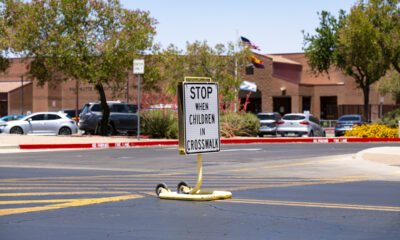arizona
Tucson Entrepreneurs Remain Optimistic Despite Looming Recession Threat

Uncertainty surrounding President Trump’s proposed tariffs is prompting caution among Tucson business owners, who are already grappling with rising costs during the summer slowdown. Local retailers and restaurateurs express concern about a potential recession affecting their operations.
Bani, a new store on North 4th Avenue specializing in handmade items, faces tough competition. Owners Bhawana Dulawat and her husband, Shram Bhandi, moved from Vermont to establish the shop at the former site of Everest Souvenirs. Despite economic forecasts predicting a higher likelihood of recession by 2025, they remain optimistic.
Economic forecasts by J.P. Morgan estimate the chance of a global recession this year at 40% to 60%. George Hammond, from the University of Arizona Eller College of Management, has narrowed this range to 35% to 40%, attributing the uncertainty largely to tariff implications.
Hammond explained that tariffs could significantly increase costs for businesses reliant on imported goods, potentially driving some out of operation. Rising prices can diminish consumer purchasing power, which may lead to decreased sales.
Similar sentiments were echoed by Steven Rose, co-owner of Off Fourth Outlet Store and Del Sol Store. He acknowledges the challenges yet remains confident, citing cash reserves built during past recessions as a buffer. However, managing tariffs complicates daily operations, especially with imports from Mexico, Peru, and Guatemala.
Concerns about inflation are mutual in the restaurant sector. Billy Elliott, owner of Elliott’s on Congress, noted that rising costs across the board have made trading conditions harsh. Business typically slows in summer, but this June has been particularly challenging.
Rose highlighted a troubling trend: an increase in vacant storefronts along 4th Avenue. Over the past five years, he has witnessed more closures than openings, a stark contrast to the prior decade when vacancies were uncommon.
Elliott experiences seasonal fluctuations in business, relying on events at nearby theaters to drive customer traffic. He emphasizes adaptability as crucial for survival, having faced both construction challenges and the impacts of the COVID-19 pandemic.
Dulawat and Bhandi found a way to navigate tariffs through a loophole that allows them to import goods tax-free if the monthly value remains below a certain threshold. They leverage local connections with artisans to diversify their offerings, including items typically stored away during off-peak seasons.
Hammond believes that Southern Arizona might experience a milder recession impact compared to the national average, due to its workforce in education, healthcare, and government sectors. However, risks remain, especially as federal funding cuts could affect these industries.
For Bhandi and Dulawat, a possible recession offers a chance for refinement in consumer spending habits. Bhandi suggests that economic pressures may eliminate subpar products from the market, prompting vendors to adopt more responsible practices.


















